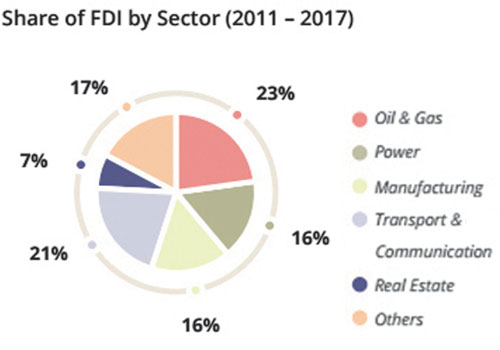Myanmar: EuroCham cites protectionist bent and tax inefficiencies as top investor concerns
A white book published by European businesses has hit out at Myanmar’s protectionist tendencies blocking or stalling liberalisation and cited tax inefficiencies as one of the top concerns among investors.
The European Chamber of Commerce Myanmar (EuroCham) published a white book, an annual publication identifying the year’s salient business, trade and investment issues affecting European investors and detailing policy recommendations.
David Levrat, EuroCham chair said the white book was the result of collaboration between EuroCham’s advocacy groups, with input from member companies investing and operating in a number of industries.
EuroCham has five advocacy groups: corporate social responsibility, construction, energy, logistics and health.
In the Myanmar-EU Economic Forum held in Nay Pyi Taw on June 8, businesses and government officials discussed the policy recommendations.
“The basis of the discussion was EuroCham’s ‘White book’, which is a bundle of position papers of European industry groups working under EuroCham with very detailed recommendations for the Union’s government,” Filip Lauwerysen, EuroCham executive director said during the event.
“[Myanmar’s economic] achievements to come will send a strong message to European businesses that Myanmar is an attractive investment destination with a government that is a committed and reliable partner in boosting job creation and economic development in a sustainable manner,” Mr Levrat told The Myanmar Times.
The white book listed six concerns among European investors: tax inefficiencies, lack of corporate governance, absence of intellectual property laws, bureaucracy, protectionism and the infrastructure gap. Sector-specific concerns are addressed separately in the publication.
Infrastructure and bureaucracy have been longstanding issues for both domestic and international businesses in the country. The white book said bureaucracy slowed down the creation of employment opportunities while reliable infrastructure was necessary for businesses to expand their services in Myanmar.
“Hierarchical organisation structures, slow decision-making process, redundant steps and processes and low level of division of tasks are the factors that often cause significant slowdowns and delays for investors creating jobs in Myanmar,” the publication stated, adding that streamlining and delegation are pivotal.
“[The bureaucracy] can be streamlined to optimise the processes. It is also advised that government agencies exercise some level of empowerment and delegation of tasks to encourage more efficient processes,” it recommended.
Tax inefficiencies came first among the issues mentioned. The public has very limited knowledge and awareness of tax-related issues. While the administration has been active in carrying out stricter measures to enforce tax collection, more efforts are needed.
“… the tax culture is in dire need of improvement and tax evasions are common due to a legacy of little to non-existent enforcement in the past.
“Complex procedures also cost taxpayers additional resources such as time and manpower.
“Frequent changes in the procedures and systems without prior notice have also caused additional burden on the taxpayers,” the publication explained.
EuroCham suggested enhancing tax education and raising awareness of importance of tax throughout the country, simplifying and streamlining tax procedures and introducing penalty schemes to crack down tax evasion, while cautioning against sudden changes in procedures.
“Simplifying and streamlining tax procedures could optimise the tax collection system as well as minimise the use of resources on unnecessary steps or methods.
“Changes in procedures and systems should only take place with prior notice while also allowing time for the taxpayers to adapt to the new system.
“The government could also enforce effective measures to combat tax evasion such as penalty schemes,” it said.
Another major challenge is protectionism.
The white book stops short of labelling legislative reform efforts as “protectionist” in its heading, opting, instead, a milder description “prioritisation of local businesses”. But, no doubt, the document is hitting out at protectionism, stating that “In an attempt to protect domestic businesses, legislative reform efforts have had a special focus on local companies.”
It went on to name trading rights and the financial sector as two examples which restrictions are in place to prevent foreign investors from competing in a level-playing field.
“As of today, foreign businesses are operating amid restrictions such as restrictive trading rights. “Another example is that foreign banks are permitted to operate in the market by providing only a number of specific services.
“In order to attract foreign investors, Myanmar needs to offer an investment-friendly climate and provide a level-playing field,” it stated, adding that the government’s possible liberalisation to allow foreign imports of agricultural, medical and construction materials is a “very positive move” toward achieving a level-playing field.
The white book recommended the government to review which industries that could have positive impacts on the economy by allowing trading rights.
EuroCham also framed the absence of intellectual property laws as one of the “most threatening issues for investors in Europe looking at Myanmar”.
“In 2013, draft laws for industrial designs, patent, trademarks and copyright were submitted to the parliament and are still pending as it is unknown when these bills will be passed.”
The lack of corporate governance practice is also a concern.
“Most businesses lack corporate practices such as a proper organisational structure, a clear set up where the businesses abide by regulations such as tax, efficient and effective operation procedures and internal policies and practices.
“When dealing with many local businesses, foreign investors are advised to take into consideration that the lack of corporate governance could slow down the overall process,” the white book argued.
Filip Lauwerysen told The Myanmar Times that these issues were bottlenecks for Myanmar’s economy to leapfrog.
“While Myanmar offers great business opportunities for investors, there are a few challenges that could potentially set back further development of the economy.
“EuroCham Myanmar wishes to take the opportunity to propose recommendations to the government to tackle these issues effectively,” he said.
Source: http://www.mmtimes.com/index.php/business/26378-eurocham-cites-protectionist-bent-and-tax-inefficiencies-as-top-investor-concerns.html


 Thailand
Thailand




